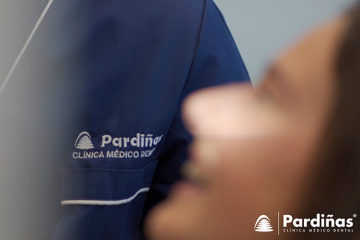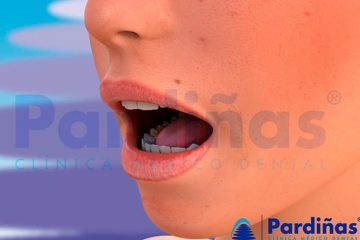Several recent studies have highlighted the possible injuries that occur in the mouth due to COVID-19. Almost half of the patients who suffer from this disease present manifestations on the skin and mucosa, but its symptoms can extend to other areas related to oral health.
A) Whiy does COVID-19 affect the mouth?
There are receptors in cells to which various molecules bind, generating a response from it. An example of this type of molecule is hormones or neurotransmitters. In the case of the SARS-CoV-2 virus, it is well documented that the ACE2 receptor (Angiotensin-converting enzyme) is the target receptor for this virus. This ACE2 has a high expression in the cells of the oral mucosa, especially the salivary glands, tongue and tonsils. For this reason, the virus has a special affinity for this type of cells, with the mouth being an ideal habitat for COVID-19 infections.Once the virus has infected the host cell, viral replication begins in it. Its effects generate the infection and inflammatory response in the tissue, in this case the taste buds, the cranial nerves and the salivary glands.
Similarly, the mouth can be indirectly affected by COVID-19 due to the association with the physical and psychological stress of this time of pandemic and, secondarily, by the use of drugs to treat the disease.

B) What symptons does the coronavirus cause in the mouth?
Although since the first infections this disease has manifested itself in many different ways, cases of inflammation of the taste buds, swelling of the tongue and partial depapilation of it, mouth sores, gingivitis, mucositis, burning sensation and taste disturbances.

B1) COVID-19 can cause inflammation of the gums:
The high number of cytokines produced by the SARS CoV-2 virus infection can cause a general inflammation of the tissues, including gums. In addition, recent studies showed that patients with some type of gum disease, such as periodontitis, have a 9 times higher risk of complications from COVID-19.

B2) The coronavirus and its relationship with dry mouth:
Various studies link COVID-19 with xerostomia or dry mouth. This is due, on the one hand, to the use of a mask, since it increases the frequency of mouth breathing, drying the mucous membranes. On the other hand, the SARS CoV-2 virus can affect the cells of the salivary glands, causing them to produce a lower quantity and quality of saliva. Cases of inflammation of this type of glands have also been described, having come to cause parotitis (mumps).

B3) The connection between sores and SARS CoV-2
These ECA2 receptors that we mentioned earlier are also found on the surface of endothelial cells, such as those that form blood vessels. So the involvement of these blood vessels can cause the tissues to run out of oxygen, producing ulcers and necrosis in the mouth and its consequent canker sores.

B4) Fractures or cracks of teeth in times of pandemic
During the COVID-19 pandemic, there has been an increase in patients with fractured or cracked teeth. This is possibly due to an increase in a harmful habit such as bruxism or teeth grinding, a disorder closely associated with psychological stress and sleep disturbances.
B5) Loss of smell and taste due to COVID-19
One of the most common symptoms among coronavirus patients is loss of taste (ageusia) and smell (anosmia). It is estimated that around 50% of those affected by this disease experience some alteration of this type, especially in milder cases. The loss of the sense of taste and smell may be related to the involvement of the nerves that transmit these sensations to the brain.
Furthermore, as the tongue has a large number of ACE2 receptors, it is one of the main entry areas for this virus. Therefore, lesions on the tongue such as depapilation, inflammation and the aforementioned loss of taste may appear.

C) How are oral problems associated with COVID-19 treated?
Various treatments have been proposed to combat oral problems associated with the coronavirus (corticosteroids, antihistamines, rinses, antibiotics ...), but without showing clear effectiveness. Most oral manifestations resolve on their own within three days to three weeks after diagnosis.

D) Can an oral disease aggravate the symptoms of the coronavirus?
Recent studies indicate that there is a close relationship between COVID-19 and underlying diseases that may exist in the patient's mouth, such as periodontitis. In a study carried out on half a thousand people affected by coronavirus, it was found that those who suffer from periodontal disease have a 9 times higher risk of ending up in the ICU, 4.5 times higher of requiring assisted ventilation and, with all this, a higher mortality rate. This could be because periodontitis is an infectious disease that causes inflammation and destruction of periodontal tissues (ligaments, bone, and gums). This ailment is produced by bacteria that cause the body to generate a series of inflammatory mediators, which can enhance the inflammation itself created by the SARS-CoV-2 virus and aggravate symptoms in any part of the body, since bacteria and mediators Inflammatory drugs can travel through the bloodstream to other places.

E) Do masks affect oral health?
Although masks have become the first line of defense against the spread of COVID-19 and its use is highly recommended, these also has its negative consequences for oral health:

E1) Masks modify our way of breathing:
The use of these protective equipment makes us breathe faster and through the mouth, which causes it to dry out more. Likewise, there is an increase in the amount of CO2, which produces an acidic environment, ideal for the growth of bacteria.
E2) Masks can favor the development of cavities:
The dry mouth generated by oral breathing typical of the use of the mask, can cause an increase in the number of cavities due to the lack of saliva, our main defense against this pathogen.

E3) The use of a facemask and gum inflammation:
In the same way, the lack of saliva in the mouth favors the proliferation of bacteria that can cause the gums to become inflamed.
E4) The relationship between bad breath and the use of a mask:
Halitosis (bad breath) is produced mainly by the compounds generated by bacteria when breaking down food remains, although it is also related to the variation in saliva production. For this reason, it is possible to notice a change in the smell of the breath when the mask is used for several hours and the dryness of the mouth increases.

E5) How to prevent mouth problems caused by the mask
As we have seen so far, the use of protective equipment has slightly negative consequences for our oral health. But these can be alleviated or reduced by following certain guidelines:
It is essential to keep your mouth and body hydrated, making sure to drink a sufficient amount of water daily.
Dental hygiene is paramount. Routine tooth brushing, flossing, and rinses is the best weapon against potential oral problems.
It is advisable to use clean masks and change them frequently. Its effectiveness is altered with its use.
In turn, you should go to the dentist for the appropriate periodic check-ups.

F) Dentists and the prevention of COVID-19:
Dentists can play an important role in the prevention of coronavirus by being able to recognize possible oral manifestations of this disease. For this reason, it is also recommended to perform a complete oral exam routinely in all suspicious patients. In addition, maintaining proper oral hygiene is key to preventing tooth decay, periodontal disease, and infections in the mouth. At Clínica Médico Dental Pardiñas we are at your disposal for this or any other problem related to oral health.


